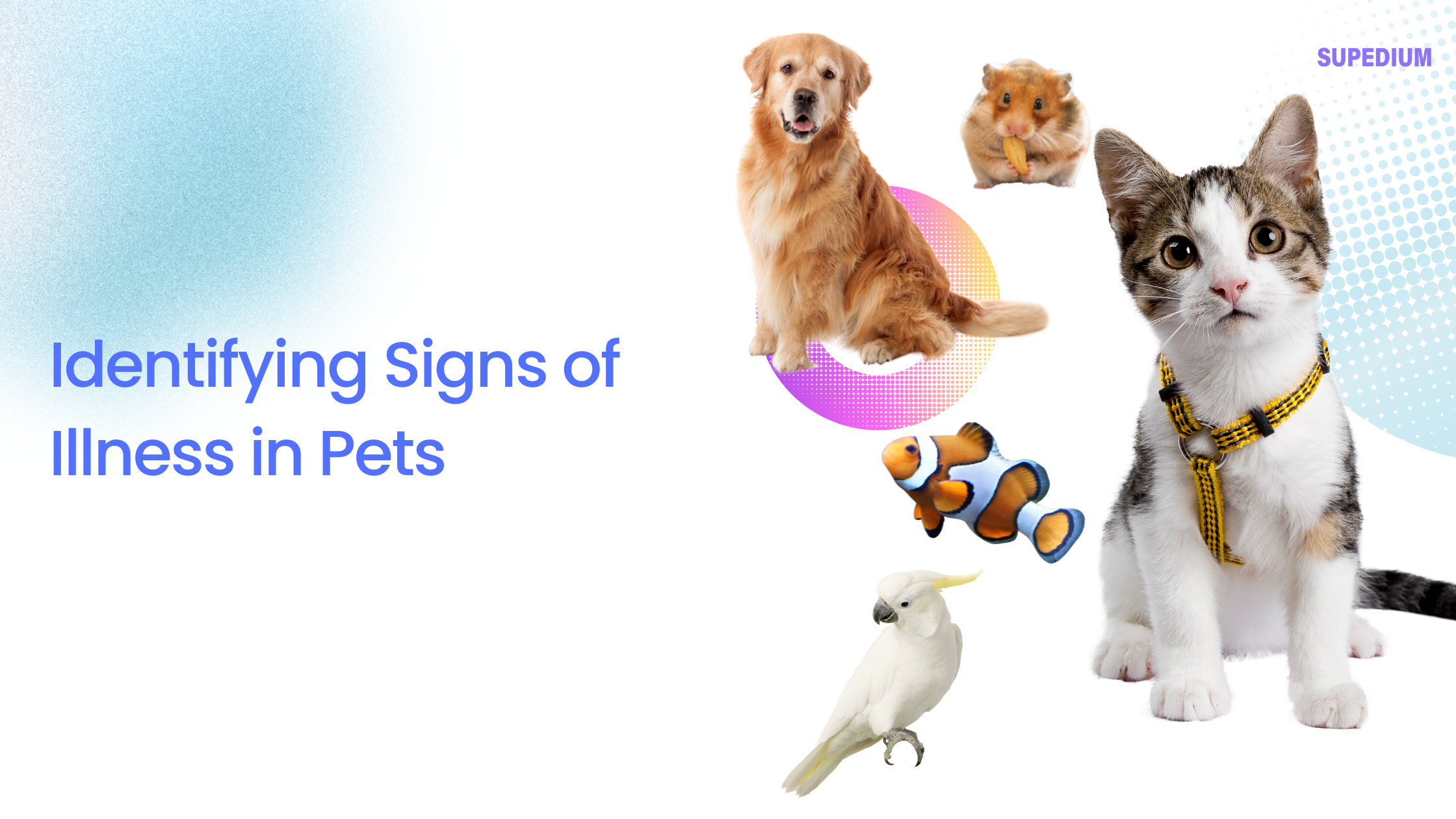Table of Contents
![]()
Introduction
Monitoring your pet’s health is crucial for their well-being and longevity. Early detection of illnesses can lead to timely medical intervention, improving your pet’s quality of life and potentially saving them from more serious health issues. Pets, like humans, can experience a range of health problems, and recognizing the signs of illness is essential for effective care. This guide will provide insights into how to identify signs of illness in dogs, cats, and other common pets, as well as general monitoring practices and preventative measures.
General Signs of Illness in Pets
Behavioral Changes
Behavioral changes are often the first indicators that something might be wrong with your pet. Common behavioral signs include:
- Lethargy or Decreased Activity: If your pet suddenly becomes less active, refuses to play, or seems unusually tired, it could be a sign of illness.
- Changes in Appetite or Drinking Habits: A sudden loss of appetite or excessive eating and drinking can indicate various health issues, ranging from infections to chronic diseases.
- Unusual Aggression or Withdrawal: Pets may become aggressive or withdraw from interaction when they are in pain or discomfort. Such changes in behavior should not be ignored.
Physical Symptoms
Physical symptoms are also important indicators of illness:
- Changes in Weight: Noticeable weight loss or gain can be a sign of underlying health issues. Weight loss may indicate problems such as diabetes or cancer, while weight gain might be related to thyroid problems or poor diet.
- Abnormalities in Coat or Skin: A dull coat, excessive shedding, or skin changes (such as lumps or sores) can be signs of skin infections, allergies, or other conditions.
- Changes in Bowel or Urinary Habits: Changes in stool consistency, frequency of bowel movements, or urination patterns can signal gastrointestinal or urinary tract issues.
Specific Signs by Type of Illness
Dogs
- Gastrointestinal Issues:
- Vomiting or Diarrhea: Frequent vomiting or diarrhea can indicate infections, dietary indiscretions, or more serious conditions like pancreatitis or gastrointestinal obstruction.
- Changes in Stool Color or Consistency: Abnormal stool may suggest digestive problems or systemic illnesses.
- Respiratory Problems:
- Coughing, Sneezing, or Labored Breathing: These symptoms could indicate respiratory infections, allergies, or more severe conditions such as heart disease.
- Nasal Discharge or Wheezing: Persistent nasal discharge or wheezing can be signs of respiratory infections or allergies.
- Orthopedic Issues:
- Limping or Difficulty Walking: If your dog is limping or having trouble moving, it may be suffering from joint issues, arthritis, or injuries.
- Signs of Pain When Touched or Moving: Any indication of pain, such as whimpering or reluctance to move, should be evaluated.
Cats
- Urinary Tract Issues:
- Frequent Urination or Straining: Difficulty urinating or frequent trips to the litter box can indicate urinary tract infections or blockages.
- Blood in Urine or Changes in Litter Box Habits: Blood in the urine or changes in litter box use can be symptoms of urinary tract problems or kidney disease.
- Dental Problems:
- Bad Breath, Drooling, or Difficulty Eating: Dental issues, such as gingivitis or tooth decay, can cause bad breath, drooling, and eating difficulties.
- Visible Plaque or Gingivitis: Noticeable plaque buildup or gum inflammation is a sign that your cat needs dental care.
- Skin and Coat Issues:
- Excessive Grooming or Scratching: Frequent grooming or scratching can be a sign of skin allergies, parasites, or infections.
- Loss of Fur or Visible Parasites: Bald patches or visible parasites, such as fleas or mites, indicate dermatological issues that need attention.
Other Pets (e.g., Birds, Rabbits)
- Birds:
- Changes in Vocalizations or Behavior: If a bird becomes quieter or exhibits unusual behavior, it may be ill.
- Fluffed Feathers or Changes in Droppings: Birds that puff up their feathers or have abnormal droppings might be sick.
- Rabbits:
- Changes in Eating or Drinking Habits: A decrease in appetite or water consumption can be a sign of digestive or dental problems.
- Abnormal Stool or Signs of Discomfort: Changes in stool or signs of pain (such as grinding teeth or hunching) should be checked by a vet.
Monitoring and Record-Keeping
Importance of Tracking Changes
Keeping a record of your pet’s health is crucial for identifying and addressing potential issues:
- Documenting Symptoms and Behavior Changes: Regularly noting any changes in your pet’s behavior or physical condition can help in early diagnosis and treatment.
- Keeping Records of Feeding, Drinking, and Elimination: Tracking these aspects can provide valuable information to your veterinarian about your pet’s health status.
When to Consult a Veterinarian
Consult your veterinarian if you notice:
- Persistent or Worsening Symptoms: Symptoms that do not improve or get worse over time should be evaluated by a professional.
- Sudden Changes in Behavior or Health: Rapid changes in behavior or health status often indicate the need for immediate medical attention.
Preventative Measures
Regular Veterinary Check-Ups
Regular veterinary visits are essential for maintaining your pet’s health:
- Importance of Routine Examinations: Regular exams allow for early detection of health issues before they become serious.
- Vaccinations and Preventive Treatments: Keeping up with vaccinations and preventive treatments can protect your pet from various diseases and conditions.
Maintaining a Healthy Lifestyle
Promoting a healthy lifestyle can help prevent many health issues:
- Proper Diet and Nutrition: Providing a balanced diet tailored to your pet’s needs supports overall health and prevents obesity and related issues.
- Exercise and Mental Stimulation: Regular physical activity and mental stimulation are important for maintaining physical and psychological health.
Conclusion
In summary, identifying signs of illness in pets requires careful observation of both behavioral and physical changes. By understanding common symptoms and maintaining regular veterinary care, you can ensure your pet stays healthy and happy. Proactive monitoring, timely medical intervention, and preventative care are key components of responsible pet ownership. For more information, consult with your veterinarian or refer to trusted pet care resources.
Share This





Be the first to comment